Saturday, November 16, 2024
139th Anniversary of the Hanging of Louis
Riel
November 16, 1885
Infamous Day in the History of Canada
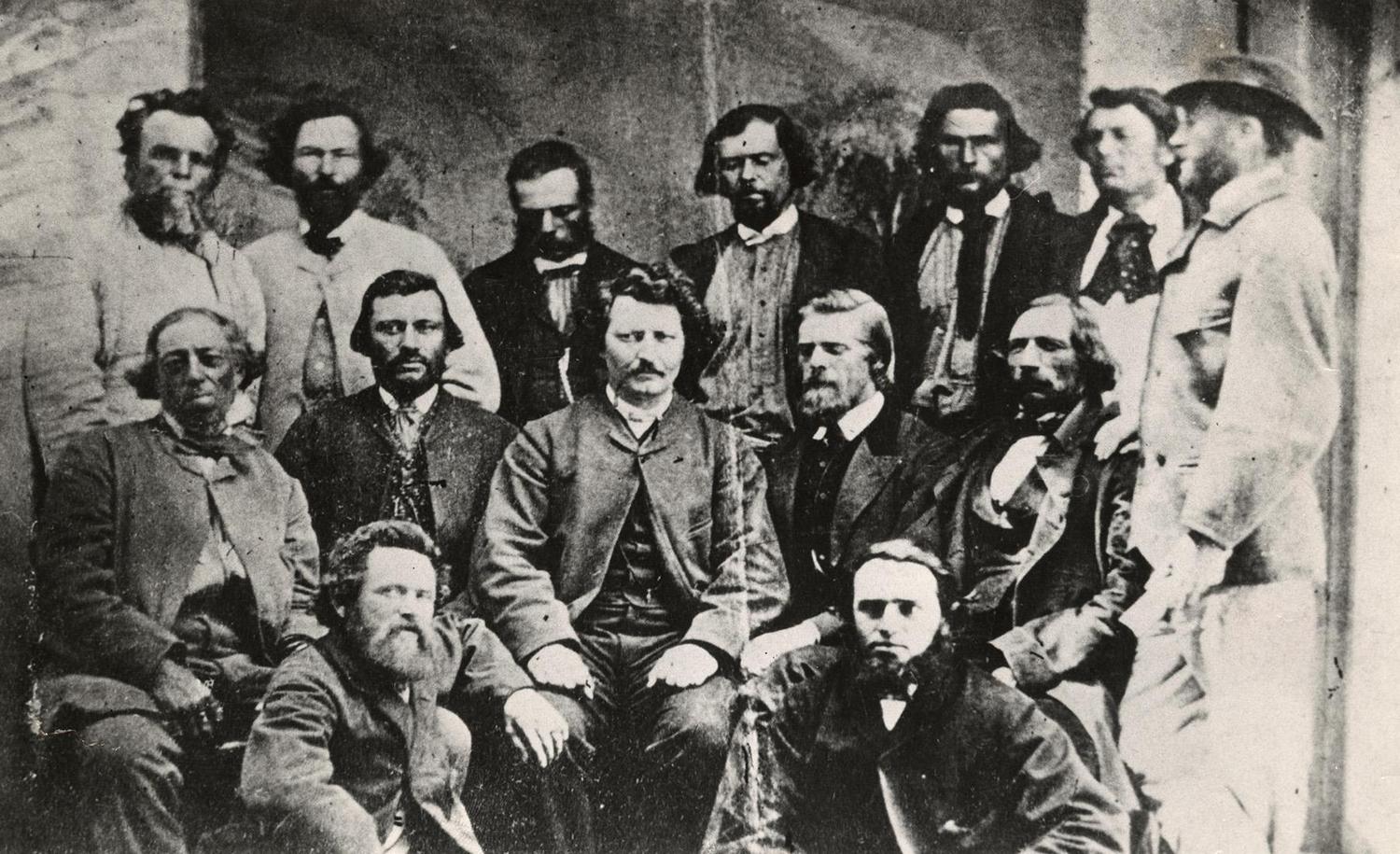 Métis leader Louis Riel
(centre) with councillors of the Métis Legislative Assembly
of Assiniboia.
Métis leader Louis Riel
(centre) with councillors of the Métis Legislative Assembly
of Assiniboia.
• Infamous Day in the History of Canada
Song
139th
Anniversary of the Hanging of Louis Riel
November 16, 1885
Infamous Day in the History of Canada
"When
the Government of Canada presented itself at our doors it found
us
at
peace. It found that the Métis people of the North-West
could not only
live well without it but that it had a government of its
own, free, peaceful, well-functioning, contributing to the work
of
civilization in a way
that the Company from England could never have done without
thousands
of soldiers.
It was a government with an organized
constitution whose jurisdiction
was more legitimate and
worthy of respect, because it was exercised
over a country
that belonged to it."
—
Louis Riel, 1885
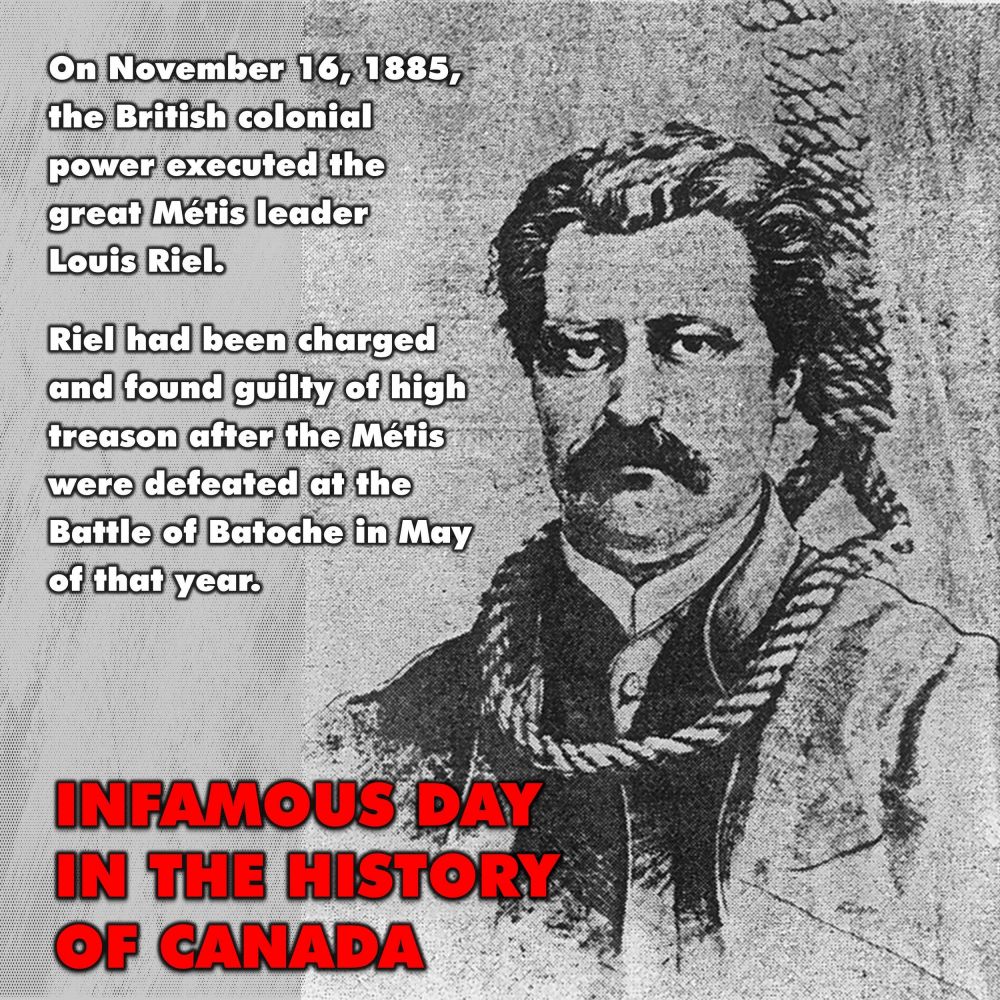 On
November 16, 1885, the British colonial power executed the great
Métis leader Louis Riel. Riel had been charged and found
guilty of high treason after the Métis were defeated at the
Battle of Batoche in May of that year. The execution of Louis
Riel was intended to finish off the Métis nation, but this was
unsuccessful. Far from putting an end to the fight of the Métis
for their rights and dignity as a nation, the struggle of the
Métis to affirm their right to be and exercise control over
their political affairs continues to this day.
On
November 16, 1885, the British colonial power executed the great
Métis leader Louis Riel. Riel had been charged and found
guilty of high treason after the Métis were defeated at the
Battle of Batoche in May of that year. The execution of Louis
Riel was intended to finish off the Métis nation, but this was
unsuccessful. Far from putting an end to the fight of the Métis
for their rights and dignity as a nation, the struggle of the
Métis to affirm their right to be and exercise control over
their political affairs continues to this day.
The two great uprisings of the Métis — the Red River Uprising (1869-1870) and North-West Uprising (1885) — were not isolated events but took place at a time when the Indigenous Peoples and the Quebec nation were also striving to affirm their nationhood, and at a time of revolutionary ferment in Europe. The Métis' uprisings represented a response to the colonial project that sought to reproduce the British state in North America and block the legitimate aspirations of the peoples that comprised the country called Canada.
The British North America Act of 1867 and the federal government's purchase of Rupert's Land from the Hudson's Bay Company in 1869-1870, juxtaposed with the decline of the traditional Métis economy based on the buffalo hunt, forced the Métis to engage in a power struggle with the colonial authorities and negotiate Manitoba's entry into the Confederation after the establishment of a Legislative Assembly. The spirit that motivated Riel and the members of the provisional government at the time is contained in the Declaration of the Inhabitants of Rupert's Land and the Northwest that affirms the sovereignty of the Métis over their lands. The latter also refused to recognize the authority of Canada, "[...], which presumes to have the right to come and impose on us a form of government even more incompatible with our rights and our interests [...]."
|
The Manitoba Act, which established that province, was voted on and passed in the federal Parliament in May 1870. The government wasted no time in exerting control over its new territory as evidenced by the Wolseley military expedition later that year (which led to Riel seeking refuge in the U.S. to avoid being killed), the creation of the North-West Mounted Police (1873) and the Indian Act (1876). Prime Minister John A. Macdonald championed the colonization of the west and the development of agriculture with the national policy he had been promoting since 1878. With the help of the Oblates (lay members of the Catholic Church affiliated with a monastic community), the authorities sought to settle the Métis and force them to adopt an agricultural lifestyle. The Métis rejected a framework which imposed on them an alien way of life. Despite this, under pressure from land speculators, some Métis sold the land that had been granted to them and settled in Saskatchewan.
This was a period when nationalism was in the air. The events in Manitoba alerted Quebeckers to the fragility of the Métis' situation, while the abolition of the teaching of French in New Brunswick in 1871 indicated the need for organization. National organizations to defend the rights and interests of Francophones, such as the Saint-Jean-Baptiste Society, spread across the continent with the waves of migration from the St. Lawrence valley. The National Convention of Montreal in 1874 and the Saint-Jean-Baptiste celebrations in Quebec in 1880 and Windsor in 1883 brought together delegations from all of what was called French America in a strong show of the vitality of the "French-Canadian family." Acadians held their first convention in 1881 where they held a celebration and adopted a national doctrine.
Métis leaders, under the sway of the Church at that time, did not rock the boat. In the aftermath of the Red River resistance, the Saint-Jean-Baptiste Society of Manitoba was founded in Saint-Boniface, Manitoba, whose vice-president was none other than Louis Riel. This association included in its infancy as many French Canadians as Francophone Métis.
However, aware of their distinct identity, Métis leaders wished to forge their own nationalism. Riel would come to articulate a Métis nationalism, with its own holidays and national symbols. This process would culminate in the creation of the Métis National Council at Batoche in September 1884, to promote the development of their political vision.
The Métis once again took up arms to affirm their nationhood and right to be in the North West Rebellion of 1885. For three days between May 9 and May 12, 1885, 250 Métis fought valiantly against 916 Canadian Forces at the Battle of Batoche but were defeated and Riel surrendered.
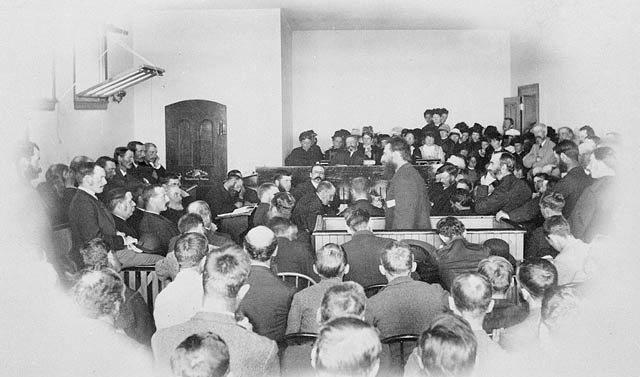 Louis Riel's address to the jury
in Regina
courtroom, July 1885.
Louis Riel's address to the jury
in Regina
courtroom, July 1885.
Macdonald and his cabinet took a hard line with respect to Riel and his compatriots. Riel was tried in Regina over five days in July 1885. After half-an-hour's deliberation he was found guilty of treason by the jury, which recommended mercy. Nevertheless, Judge Hugh Richardson sentenced him to death. From September 1885 to October 1886, Riel and several of his comrades, all Indigenous, would be condemned to hang.
While times have changed, the Canadian state has inherited the colonial power and it persists in the aim of negating the nationhood of the Métis, Indigenous Peoples and Quebec. The proud history of the Métis and their fight to affirm their rights and nationhood is not some historical artifact gathering dust, but continues to gleam brightly in the light of the present day. The fight to affirm rights that belong to people by virtue of their being human is precisely the fight for modern, human-centred arrangements. Louis Riel's life epitomized the fight for the recognition of rights on a modern basis.
Louis Riel's life is an important legacy that is as relevant as ever at this time when the Canadian state is doing its utmost to negate the rights of the Métis, Indigenous Peoples and the Quebec nation, as well as the workers, women, youth, national minorities and all the collectives in the society, all in the name of security, balance, austerity and other notions inherited from the 19th century colonial projects.
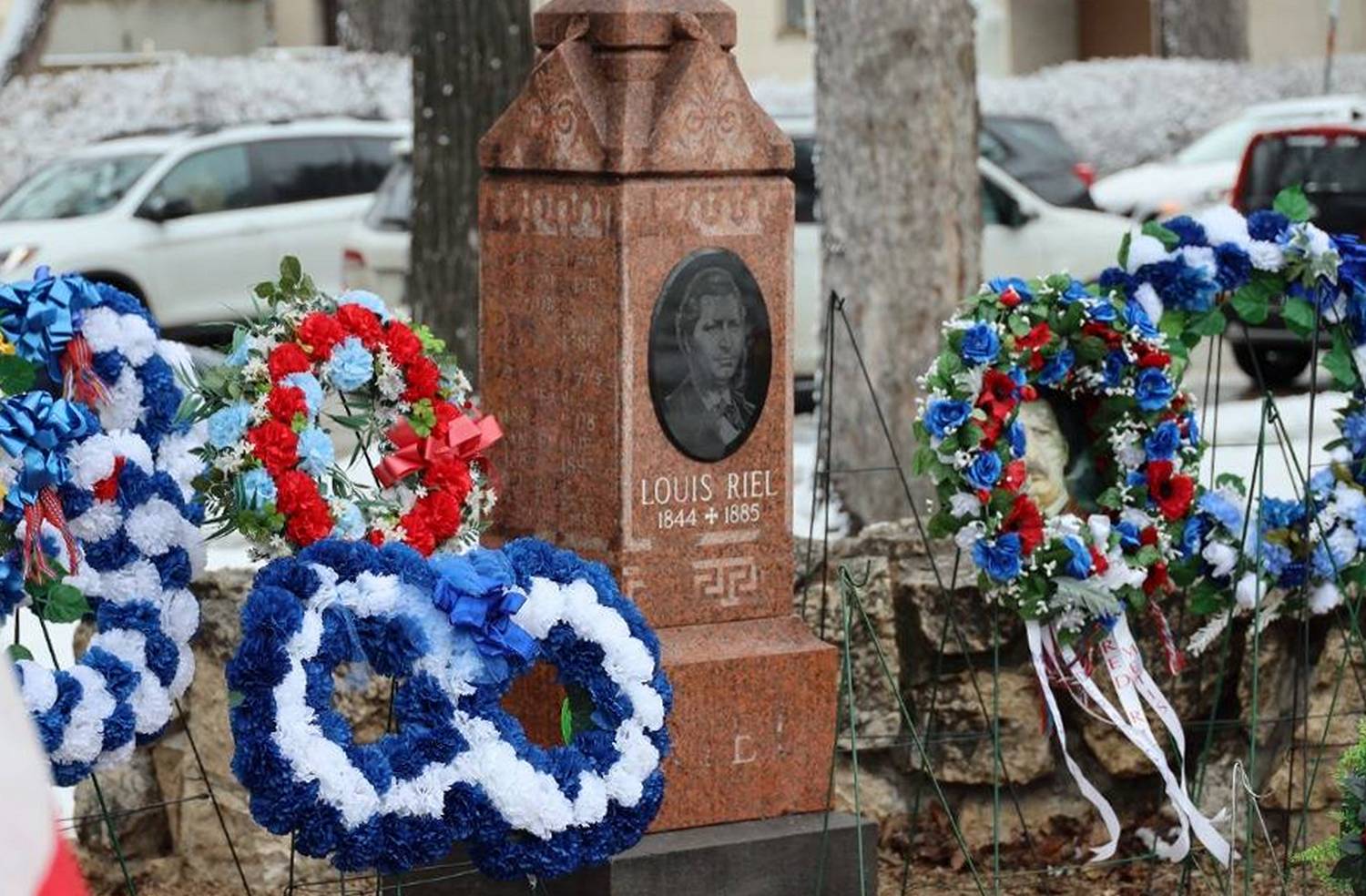 Annual commemoration of Louis Riel,
organized by the Manitoba Métis Federation, at his grave in
front of Saint-Boniface Cathedral in Winnipeg, November 16,
2023.
Annual commemoration of Louis Riel,
organized by the Manitoba Métis Federation, at his grave in
front of Saint-Boniface Cathedral in Winnipeg, November 16,
2023.
(Based on an article by Marc-André Gagnon published in Chantier politique no. 32, November 18, 2013. Translated from the original French by TML. Photos from public archives and Manitoba Métis Federation.)
Song
Louis Riel
Performed by : Yann Perreau; Written by Alexandre Belliard
Une horde ambitieuse en mal de nouvelles terres
Débarque chez les Métis comme s'ils
n'existaient guère
D'un océan à l'autre, chemin de fer
à tout prix
Les millionnaires du rail se sont offert un pays
Riel, chef légitime de l'Assiniboia
Réclame en homme digne, le respect de leurs droits
Trahi par Ottawa, traité comme du bétail
Les Métis n'ont plus le choix, il faut livrer
bataille
Victoire à Rivière-Rouge et
près de Lac aux Canards
Tous leurs espoirs s'écroulent à Batoche
plus tard
Riel, les fers aux pieds ; écroué
à Regina
« Coupable », disent les jurés
; Richardson sonne le glas
Parodie de justice dans le plus
grand désordre
C'est la haine qui dicte, la potence et la corde
De la furie orangiste, Thomas Scott est le fiel
Macdonald le complice, de la mort de Riel
Telle une cicatrice profonde qui lacère
La mémoire des Métis, que rien ne fera
taire
Francophones de partout expriment leur colère
Et pleurent Louis Riel, assassiné hier
Du gibet de ce dernier ne reste
qu'une estampe
Un bout de corde, un musée, la maison de ses parents
Et lui qui fut pourtant père du Manitoba
Doit encore aujourd'hui, essuyer les coups bas
Martyr pour les uns et traître pour les autres
L'histoire le portera en vainqueur face aux fauves
On le voudrait oublié, c'est qu'il
dérange encore
Toujours controversé, plus d'un siècle
après sa mort
***
An ambitious horde in search of new
lands
Arrive among the Métis as if they hardly existed
Coast to coast, a railroad at any costs
Railroad millionaires gave themselves a country
Riel, legitimate leader of the
Assiniboia,
As a man of dignity, demands respect for their rights
Betrayed by Ottawa, treated like cattle
The Métis no longer have a choice, they must fight
Victory at Rivière-Rouge and near Lac-aux-Canards
Later all their hopes crumble at Batoche
Riel, in shackles ; locked up in Regina
"Guilty," say the jurors ; Richardson sounds the death knell
Parody of justice in the greatest
disorder
It's hate that dictates, the gallows and the noose
From the fury of the Orange Order, Thomas Scott is the
bitterness
Macdonald the accomplice, in Riel's death
Like a deep scar that slashes
The memory of the Métis, that nothing will silence
Francophones everywhere express their anger
And mourn for Louis Riel, murdered yesterday
From the latter's gallows only one
print remains
A piece of rope, a museum, his parents' house
And he who was nevertheless the father of Manitoba
Must still take the low blows today
Martyr for some and traitor for others
History will convey him the winner against the wild beasts
They would like him forgotten, because he still disturbs them
Still controversial, more than a century after his death
(English translation by TML.)
(To access articles individually click on the black headline.)
Website: www.cpcml.ca • Email: editor@cpcml.ca

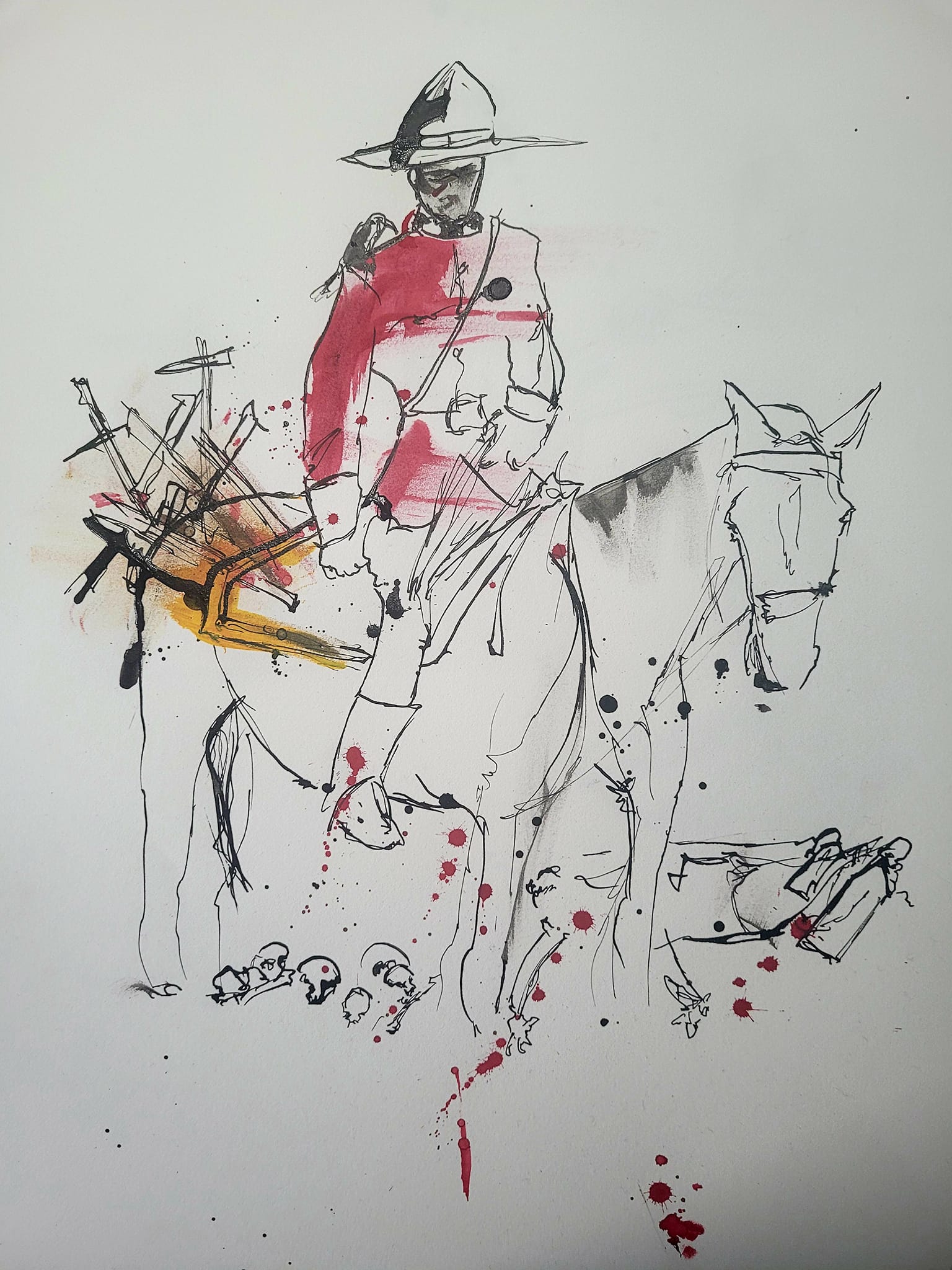 Royal
Canadian Mounted Police, successor to the North-West
Mounted Police,
continues crimes against Indigenous peoples in the
present.
Royal
Canadian Mounted Police, successor to the North-West
Mounted Police,
continues crimes against Indigenous peoples in the
present. 